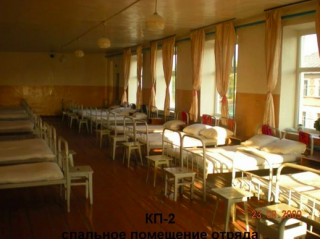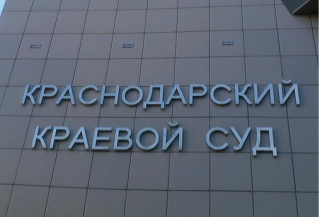
New Managing Director for Bellona Norway
The Board of the Bellona Foundation has appointed former Minister of Climate and the Environment Sveinung Rotevatn as Managing Director of Bellona No...
News

Publish date: October 8, 2014
News
Prison officials have confirmed to Bellona they intend to move jailed anti-Olympic activist Yevgeny Vitishko to a penal colony with harsher conditions for inmates, an official at the camp holding the ecological prisoner of conscience told Bellona Wednesday by phone.
The official, who would not reveal his name to media, said that the Sadovaya settlement colony, or KP-2, a minimum security facility, had received orders from the wardens to prepare Vitishko for transfer to a medium security prison camp, which means he will have far fewer privileges than he is currently allowed.
“Typically that means fewer phone calls, fewer visitation times, less mail, less contact than he gets here,” said the prison official, who said he had no details about where Vitishko would be transferred or when.
The prison administration at the KP-2 colony have said Vitishko has broken camp regulations, for which they are transferring him to harsher conditions, but the official who answered Bellona’s phone call would not discuss what rules Vitishko had broken.

The prison official did confirm reports from Vitishko’s colleagues at Environmental Watch on the North Caucasus (EWNC) – an organization that has been in the Kremlin’s sights for its publication of damning evidence proving the Russian government shredded environmental legislation to host the 2014 Sochi Winter Olympic Games – that Vitishko has been in the Sadovaya camp’s quarantine unit awaiting transfer since September 29.
Last call to the outside world
But according to EWNC’s coordinator Andrei Rudomakha, who contacted Bellona by email, Vitishko’s last call to the outside world came on that day, when he called EWNC to inform them he was to be moved to the camp’s quarantine unit preceding transfer to another, harsher penal colony.
EWNC activist Dmitry Gutov likewise contacted members of the Tambov region’s branch of Public Oversight Committee, a prisoner’s rights organization that falls under the aegis of the Presidential Council on Human Rights.
Gutov reported that the Public Oversight Committee discovered that official orders to transfer Vitishko to rougher conditions have already been signed, but they were likewise unable to determine where he would be sent.
His lawyers Alexander Popkov and Marina Dubrovina, meanwhile, confirmed they have received no official information from the Penal Service about the planned transfer.
Vitishko’s September 29 telephone call follows his unsuccessful appeal on September 24 to have his incarceration sentence reversed.
Overturned appeal excuse to tighten screws
The appeal was, in fact, launched by the very prosecutors in Krasnodar – the Black Sea region where the Olympics were held – who asked the Krasnodar regional court to reverse it’s sentence based on numerous procedural violations in the case that landed Vitishko in prison, and before that, on a two year suspended sentence with probation.

Vitishko’s current incarceration came about when, on February 12, he launched an appeal in the Krasnodar Regional court to have the suspended sentence vacated.
At the time of that hearing, he was defending himself via video link to the Krasnodar regional court from a jail cell in his hometown of Tuapse, 120 kilometers northwest of Sochi, where he was serving a 15-day administrative sentence on trumped up charges of swearing in public.
The Krasnodar court rejected that appeal after two minutes of deliberation, and turned his two-year suspended sentences into a three-year custodial one.
During the course of his imprisonment, Vitishko has issued released via telephone and to visiting activists about mass beatings of prisoners by guards.
Prison officials seek revenge for exposé
Russian environmentalist Yevgeniya Chirikova, and Goldman Environmental Prize Laureate for 2011, said in a social media statement that, “It’s apparent that the human rights activities of Zhenya (Yevgeny) and his numerous complaints to prison officials about prisoners’ beatings to Tambov’s Federal Penitentiary Service have irritated them.”
“So, instead of addressing insufficiencies in the system, they prefer to falsify facts – alleged violations by Vitishko of the prison colony’s regime, and on this pretext are changing the terms of his sentence.
EWNC’s Rudomakha agreed, saying the prison transfer was “revenge for publicizing the lawlessness taking place at the colony.”
“They want to take away his opportunity to talk with friends and human rights activists,” said Rudomakha.
All this for alleged graffiti?
The crime Vitishko was imprisoned for was the alleged spray painting of a construction fence on public lands on the Black Sea coast, where Krasnodar Regional Governor Alexander Tkachev was building a lavish summer home.

Ironically, forestry officials for the Krasnodar Region have said numerous times they have no record of the fence’s existence.
EWNC activist and 2014 Goldman Prize laureate Suren Gazaryan, who was also sentenced with Vitishko to a two-year suspended sentence, later fled the country when he led a demonstration against the construction of President Vladimir Putin’s $1 billion mansion, also on the Black Sea coast.
Gazaryan and other activists who were present for the “fence incident,” as it has come to be known, have identified two tag-alongs to the 2011 protest in interviews with Bellona as the ones who spray painted “This is our forest” and “Tkachev is a Thief” on the fence.
International condemnation falls on deaf Moscow ears
Environmental and rights groups both domestically and internationally, including Bellona, have condemned Vitishko’s sentencing as obscenely out of proportion with the crime he supposedly committed.
“Once again, it’s more bad news concerning Vitishko,” said Nils Bøhmer, Bellona’s managing director on Wednesday. “This show that President [Vladimir] Putin is going to use this case for what it’s worth to scare other individuals and NGO’s away from doing the brave work of disclosing the truth about the environmental situation in Russia.”
Vitishko has several times been lost in prison transfers, and it’s to be expected that he will not be able to contact his colleagues, family or lawyers until he reaches his new camp, a process that could take as long as six weeks.
EWNC, Bellona, Human Rights Watch, Amnesty International and others have said Vitishko’s incarceration was meant to derail the release of EWNC’s scathing report, authored by Vitishko and Gazaryan, on the irreversible environmental damage inflicted on Russia’s Black Sea coast to host the $51 billion Sochi Winter Olympics, the most expensive Olympic Games ever.

The Board of the Bellona Foundation has appointed former Minister of Climate and the Environment Sveinung Rotevatn as Managing Director of Bellona No...

Økokrim, Norway’s authority for investigating and prosecuting economic and environmental crime, has imposed a record fine on Equinor following a comp...

Our op-ed originally appeared in The Moscow Times. For more than three decades, Russia has been burdened with the remains of the Soviet ...

The United Nation’s COP30 global climate negotiations in Belém, Brazil ended this weekend with a watered-down resolution that failed to halt deforest...